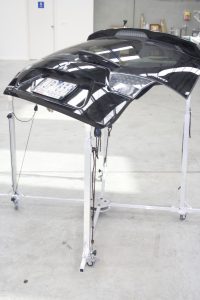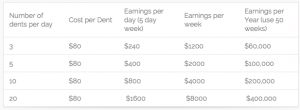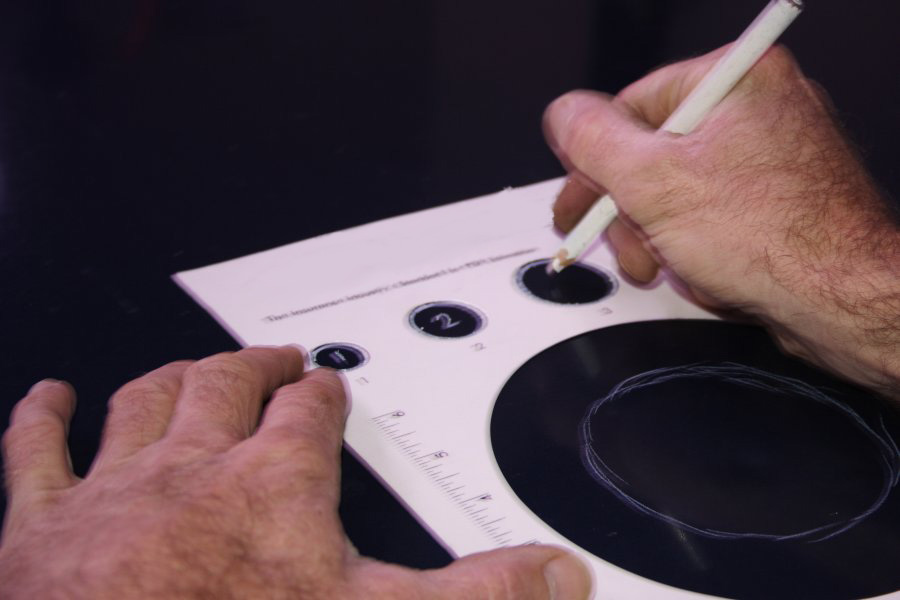At PDR Training, we specialise in providing professional training in paintless dent repair. In conjunction with components of business development discussed in class, we have designed modules and assessment procedures to ensure that trainee technicians develop specific skills allowing them to progress in confidence with increasing levels of difficulty.

Alternatively, an
Online eBook has been introduced to expedite the demand for applications in PDR Training and separate the practical from the theoretical or business component of PDR Training. The course has been designed and structured to read at your own leisure and no pressure. This eBook reveals a lot of secrets into the industry and prepares you for the future of PDR. Register for
PDR Online eBook now!
Because of the hundreds of hours required to master the skills of paintless dent removal, PDR Training Australia has developed training modules to ensure trainee technicians develop their skills under a realistic work environment. Furthermore, our specially prepared modules provide flexibility and on-site training in the industry in real time events. Find out more on
what is in our course.
Even if you are in the TAFE system, this professional training system will supplement your skills in similar trades. Our research suggests that more and more panel beaters and also mechanics are re-training to have this as one of their skills in the workshop. One of the reasons stem back to the standard requirement for PDR quotes from insurance companies.
 What incentive is there to take up a trade as a PDR Technician?
What incentive is there to take up a trade as a PDR Technician?
The answer is simple – supply and demand! There is simply a lack of PDR Technicians in Australia. Even as recent as the Melbourne hailstorm in 2010, approval was granted for special working visa permits for overseas technicians to come to Australia. Once again in the Perth and Christmas Day Melbourne hailstorm more overseas PDR technicians were able to get work in Australia.
What incentive is there for companies in the automotive to train their staff in Paintless Dent Removal?
It makes sense when considering a five year business plan to incorporate trends in the industry. The trend towards the PDR industry is already happening – not only in Australia but globally. Given the insurance industry around the world are looking for more efficient methods of repair, the demands for technicians should continue to increase.
Recently, many people have applied because they have seen first hand what PDR Technicians are earning in the work environment. Very few if any career can even compare!
What are the typical earnings?

Take for example a typical day in the storm. Each average dent for an average technician takes 2 to 3 minutes to complete and that charge is $60 – $70 per dent typically. On a per day basis, a car a day yields typically $2000 per day on average from what I have experienced! Yes it is a seasonal working in the summer months but there are no reasons of heading off to Europe and the United States with a work visa and earn during their summer period – our off season. Incidentally, I have seen $48000 paid for 2 months of work – for some that is almost a year’s wage!
Apply for training if you feel this suites your need for a change in career.
Or
contact us for more information on how this all works or call to speak to Jimmy Deguara on 0408020468.
Sign me up please…
Remember to click on first and last preferred date. (For One-on-One Course choose 3 days – all other courses are generally 5 days).
 Alternatively, an Online eBook has been introduced to expedite the demand for applications in PDR Training and separate the practical from the theoretical or business component of PDR Training. The course has been designed and structured to read at your own leisure and no pressure. This eBook reveals a lot of secrets into the industry and prepares you for the future of PDR. Register for PDR Online eBook now!
Because of the hundreds of hours required to master the skills of paintless dent removal, PDR Training Australia has developed training modules to ensure trainee technicians develop their skills under a realistic work environment. Furthermore, our specially prepared modules provide flexibility and on-site training in the industry in real time events. Find out more on what is in our course.
Even if you are in the TAFE system, this professional training system will supplement your skills in similar trades. Our research suggests that more and more panel beaters and also mechanics are re-training to have this as one of their skills in the workshop. One of the reasons stem back to the standard requirement for PDR quotes from insurance companies.
Alternatively, an Online eBook has been introduced to expedite the demand for applications in PDR Training and separate the practical from the theoretical or business component of PDR Training. The course has been designed and structured to read at your own leisure and no pressure. This eBook reveals a lot of secrets into the industry and prepares you for the future of PDR. Register for PDR Online eBook now!
Because of the hundreds of hours required to master the skills of paintless dent removal, PDR Training Australia has developed training modules to ensure trainee technicians develop their skills under a realistic work environment. Furthermore, our specially prepared modules provide flexibility and on-site training in the industry in real time events. Find out more on what is in our course.
Even if you are in the TAFE system, this professional training system will supplement your skills in similar trades. Our research suggests that more and more panel beaters and also mechanics are re-training to have this as one of their skills in the workshop. One of the reasons stem back to the standard requirement for PDR quotes from insurance companies. What incentive is there to take up a trade as a PDR Technician?
The answer is simple – supply and demand! There is simply a lack of PDR Technicians in Australia. Even as recent as the Melbourne hailstorm in 2010, approval was granted for special working visa permits for overseas technicians to come to Australia. Once again in the Perth and Christmas Day Melbourne hailstorm more overseas PDR technicians were able to get work in Australia.
What incentive is there for companies in the automotive to train their staff in Paintless Dent Removal?
It makes sense when considering a five year business plan to incorporate trends in the industry. The trend towards the PDR industry is already happening – not only in Australia but globally. Given the insurance industry around the world are looking for more efficient methods of repair, the demands for technicians should continue to increase.
Recently, many people have applied because they have seen first hand what PDR Technicians are earning in the work environment. Very few if any career can even compare!
What are the typical earnings?
What incentive is there to take up a trade as a PDR Technician?
The answer is simple – supply and demand! There is simply a lack of PDR Technicians in Australia. Even as recent as the Melbourne hailstorm in 2010, approval was granted for special working visa permits for overseas technicians to come to Australia. Once again in the Perth and Christmas Day Melbourne hailstorm more overseas PDR technicians were able to get work in Australia.
What incentive is there for companies in the automotive to train their staff in Paintless Dent Removal?
It makes sense when considering a five year business plan to incorporate trends in the industry. The trend towards the PDR industry is already happening – not only in Australia but globally. Given the insurance industry around the world are looking for more efficient methods of repair, the demands for technicians should continue to increase.
Recently, many people have applied because they have seen first hand what PDR Technicians are earning in the work environment. Very few if any career can even compare!
What are the typical earnings?
 Take for example a typical day in the storm. Each average dent for an average technician takes 2 to 3 minutes to complete and that charge is $60 – $70 per dent typically. On a per day basis, a car a day yields typically $2000 per day on average from what I have experienced! Yes it is a seasonal working in the summer months but there are no reasons of heading off to Europe and the United States with a work visa and earn during their summer period – our off season. Incidentally, I have seen $48000 paid for 2 months of work – for some that is almost a year’s wage!
Take for example a typical day in the storm. Each average dent for an average technician takes 2 to 3 minutes to complete and that charge is $60 – $70 per dent typically. On a per day basis, a car a day yields typically $2000 per day on average from what I have experienced! Yes it is a seasonal working in the summer months but there are no reasons of heading off to Europe and the United States with a work visa and earn during their summer period – our off season. Incidentally, I have seen $48000 paid for 2 months of work – for some that is almost a year’s wage!



